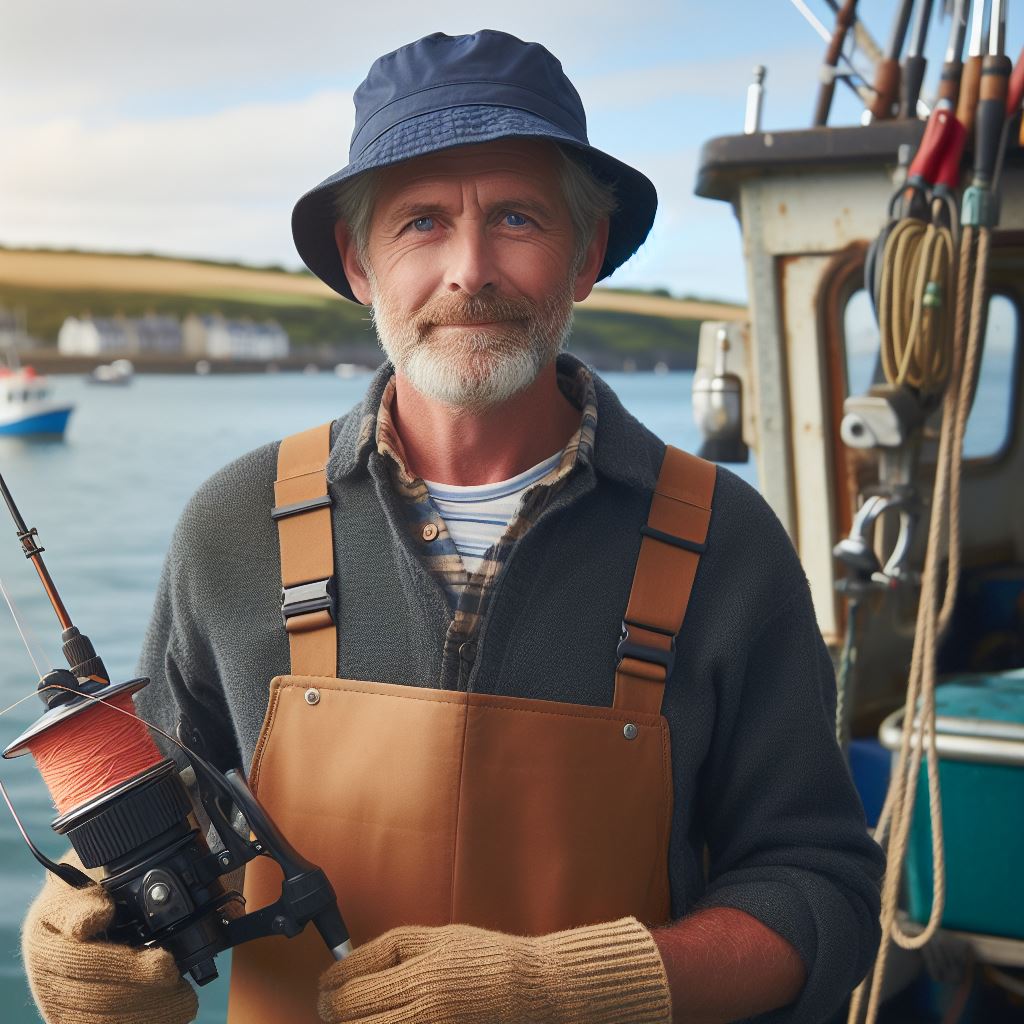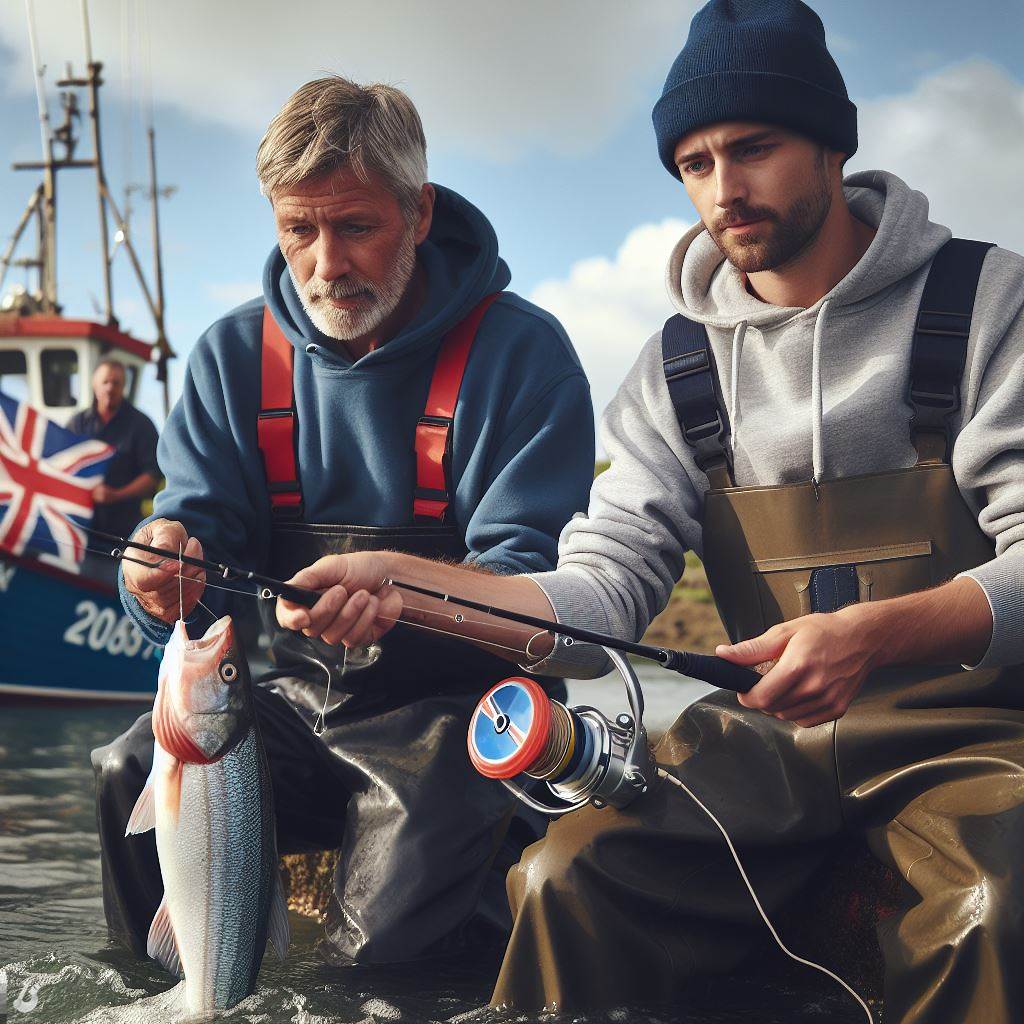Introduction
Brexit, a seismic shift, has reverberated across industries, demanding examination of its impact on UK fishermen.
This article scrutinizes the challenges and opportunities unfurling in the wake of this political transformation. With the departure from the EU, British fishermen find themselves navigating uncharted waters.
The intricacies of new regulations, trade agreements, and access to fishing grounds require a meticulous exploration.
This post keenly dissects implications for the fishing sector, illuminating how UK fishermen navigate altered dynamics.
The introduction of Brexit into the narrative of their livelihoods introduces uncertainties and complexities.
Unfolding the layers, we strive to explore challenges and potential avenues for UK fishermen’s growth in this evolving landscape.
Background on UK fishermen
History and significance of the fishing industry in the UK
- The fishing industry has a long history in the UK, dating back centuries.
- Fishing is a vital sector that supports coastal communities and provides employment opportunities.
- It has played a significant role in the UK’s economy and cultural heritage.
- Fishermen have been traditionally viewed as hardworking individuals who brave the seas to bring fresh seafood to our tables.
- Numerous ports and harbors across the UK serve as bases for fishermen and their fleets.
- The industry contributes to local economies, tourism, and supports small-scale businesses.
The role of EU Common Fisheries Policy in governing fishing rights
- The EU Common Fisheries Policy (CFP) aims to protect fish stocks and ensure their sustainable exploitation.
- All member states of the EU, including the UK, have been bound by the CFP’s regulations.
- The CFP sets quotas, catch limits, and fishing grounds to prevent overfishing and maintain biodiversity.
- It provides a framework for cooperation and ensures fair access to fishing opportunities among member states.
- However, critics argue that the CFP has favored larger countries, leading to imbalances in fishing rights.
- UK fishermen have long criticized the CFP, claiming that it has disadvantaged their industry.
- They believe that leaving the EU presents an opportunity to regain control and sovereignty over their waters.
- Leaving the EU allows the UK to negotiate its own fishing policies and regain exclusive access to its waters.
- The post-Brexit fishing negotiations have, however, been complex and contentious.
- The UK and EU are currently negotiating a new agreement that will determine future fishing rights and access.
In essence, understanding the background of UK fishermen is crucial to grasp the challenges and opportunities they face amidst Brexit.
The historical significance of the fishing industry and the EU Common Fisheries Policy’s role have shaped the current landscape.
Moving forward, the negotiation of new fishing policies will shape the industry’s future, offering challenges and opportunities.
Read: Modern Fishing Gear: UK Fishermen’s Toolkit
Challenges faced by UK fishermen due to Brexit
- Reduction in access to fishing waters.
- Potential loss of fishing quotas.
- Increased competition from EU fishermen.
- Economic implications and threat to livelihoods.
- Impact on coastal communities and fishing-dependent industries.
Brexit, the UK’s exit from the EU, creates challenges for UK fishermen, impacting access to fishing waters and risking reduced quotas.
Negotiations post-Brexit will define the extent of this access and potential quota losses.
Increased competition from EU fishermen intensifies pressure on UK waters, disadvantaging local fishermen and jeopardizing profits.
The economic implications of Brexit pose a significant threat to the livelihoods of UK fishermen.
Coastal communities, heavily dependent on the fishing industry, face potential economic decline and job losses.
The broader impact extends to related industries like fish processing, suppliers, and tourism, compounding the uncertainty.
The outcome of post-Brexit negotiations will determine the severity of challenges and the long-term viability of the UK fishing industry.
In review, Brexit presents numerous challenges for UK fishermen, including reduced fishing access, potential quota losses, increased EU competition, economic implications, and threats to livelihoods.
The uncertainty surrounding Brexit and its impact on fishing could have far-reaching consequences for coastal communities and related industries.
Read: UK Fishing Laws: What Every Fisherman Must Know
You Might Also Like: Foresters and Wildlife Conservation
Opportunities for UK fishermen post-Brexit
The UK’s departure from the European Union has presented both challenges and opportunities for the country’s fishermen.
While there are concerns about potential disruptions to trade and access to EU markets, there are also several opportunities post-Brexit.
Regaining control over fishing waters
One of the key opportunities for UK fishermen post-Brexit is the regaining of control over the country’s fishing waters.
As part of the EU, the UK had to abide by the Common Fisheries Policy (CFP), which restricted its ability to manage its own waters.
Brexit provides an opportunity for the UK to establish its own fishing policies and prioritize the interests of its fishermen.
Potential for increased fishing quotas and economic benefits
Leaving the EU also opens up the potential for increased fishing quotas for UK fishermen.
The CFP allocated fishing quotas based on historical fishing patterns, often disadvantaging UK fishermen.
With Brexit, the UK can renegotiate these quotas and potentially secure a larger share of fish stocks in its waters.
This could lead to increased catch levels and economic benefits for the fishing industry.
Development of sustainable fishing practices
Brexit also presents an opportunity for the UK to develop and implement sustainable fishing practices.
The EU’s fishing policies have been criticized for not doing enough to protect fish stocks and the marine environment.
With control over its fishing waters, the UK can introduce stricter regulations and conservation measures to ensure the long-term viability of its fishing industry.
Exploring new markets and trade agreements
As it looks to expand its fishing industry post-Brexit, the UK can explore new markets and trade agreements.
While the EU has been a major market for UK fish exports, leaving the bloc allows the country to establish its own trade relationships with other countries.
This opens up opportunities for UK fishermen to export their products to new markets and potentially increase their profitability.
Personalized UK Career Consulting
Receive tailored career guidance designed just for you. Get actionable steps and expert support to boost your career in 1-3 days. Take control of your career now.
Get StartedDiversification of fishing industry and job opportunities
Brexit provides an opportunity for the diversification of the UK’s fishing industry and the creation of new job opportunities.
With control over its fishing waters and the potential for increased catch levels, there is scope for growth in various sectors of the industry, such as processing, aquaculture, and seafood distribution.
This could create jobs and stimulate economic development in coastal communities.
Therefore, while Brexit presents challenges and uncertainties for UK fishermen, there are also significant opportunities for the industry to thrive.
Post-Brexit, UK fishermen can regain control over fishing waters, secure higher quotas, adopt sustainable practices, explore new markets, and diversify the industry for prosperity.
Read: UK Crop Farming: Trends and Techniques

Initiatives and Government Support for UK Fishermen
Government schemes and funding to assist fishermen
As the UK navigates the challenges and opportunities presented by Brexit, initiatives and government support play a crucial role in ensuring the success and sustainability of the fishing industry.
The British government has been proactive in implementing various schemes and providing financial assistance to assist fishermen in adapting to the post-Brexit landscape.
One significant aspect of government support for UK fishermen is the introduction of schemes and funding programs specifically tailored to their needs.
These programs aim to improve the industry’s competitiveness, sustainability, and overall development.
The initiatives provide fishermen with financial support to invest in modern equipment, vessels, and infrastructure, enhancing operational efficiency and reducing environmental impact.
Efforts to negotiate fair fishing agreements with the EU
In addition to financial assistance, the UK government has also made tireless efforts to negotiate fair fishing agreements with the European Union (EU).
These negotiations are essential for the fishing industry’s long-term viability, as access to EU waters is crucial for many UK fishermen.
By striving to secure fair rights and quotas, the government aims to protect the interests of UK fishermen and maintain a mutually beneficial relationship with the EU.
Support for training, education, and technological advancements in the industry
Government initiatives in the fishing industry also emphasize support for training, education, and technological advancements.
Recognizing the importance of continuous learning and skill development, the government provides funding for training programs and educational opportunities.
This enables fishermen to constantly improve their knowledge and expertise, ensuring they stay competitive in an ever-changing industry.
Furthermore, the government encourages the adoption of technological advancements within the fishing sector.
Through funding and research grants, fishermen are encouraged to embrace sustainable fishing practices and innovative technologies.
This includes investments in equipment and systems that promote responsible fishing, such as improved tracking and monitoring devices, which help reduce bycatch and protect the marine ecosystem.
By supporting training, education, and technological advancements, the government aims to empower UK fishermen to navigate the challenges posed by Brexit and tap into new opportunities.
These initiatives not only enhance the industry’s efficiency and sustainability but also equip fishermen with the necessary skills and tools to face future challenges.
Overall, initiatives and government support play a significant role in shaping the future of UK fishermen.
The government actively fosters a thriving post-Brexit fishing industry through schemes, fair agreements, and support for training and technology.
Read: UK Farming Subsidies: Understanding the Basics
Conclusion
Recap of challenges and opportunities faced by UK fishermen due to Brexit
The UK fishing industry has faced numerous challenges and opportunities since Brexit. On one hand, there is a sense of loss due to decreased access to EU waters and potential trade barriers.
On the other hand, there are new opportunities with regained control overfishing quotas and access to larger shares of fish stocks.
Your Dream Job Starts with a Perfect CV
Get a tailored CV and cover letter that captures your unique strengths and stands out in your industry. Let us help you make an unforgettable first impression.
Get StartedEmphasize the need for collaboration and resilience in navigating post-Brexit changes
It is crucial for UK fishermen to collaborate with government bodies, fishing communities, and industry stakeholders to navigate the complex changes brought about by Brexit.
They must work together to find innovative solutions, adapt to new regulations, and capitalize on the available opportunities to ensure the long-term viability of the fishing industry.
Closing thoughts on the future of UK fishermen and the fishing industry in the UK
In the end, the future of UK fishermen and the fishing industry is uncertain but promising.
While Brexit has presented challenges, it has also offered a chance for the UK to regain control over its waters and fisheries.
By embracing resilience, adaptability, and collaboration, UK fishermen can safeguard their livelihoods and steer the fishing industry towards a prosperous and sustainable future.
[E-Book for Sale]
500 Cutting-Edge Tech Startup Ideas for 2024 & 2025: Innovate, Create, Dominate
$19.99 • 500 Tech Startup Ideas • 62 pages
You will get inspired with 500 innovative tech startup ideas for 2024 and 2025, complete with concise descriptions to help you kickstart your entrepreneurial journey in AI, Blockchain, IoT, Fintech, and AR/VR.




